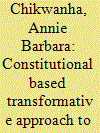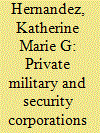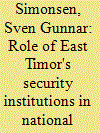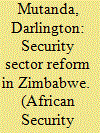| Srl | Item |
| 1 |
ID:
180623


|
|
|
|
|
| Summary/Abstract |
The article reviews contemporaneous security sector reform (SSR) models and proposes an Afrocentric human security oriented alternative, a constitutional based transformative approach. The post-colonial security sector in African countries continues to struggle with converting and infusing the nationalist liberators’ underlying values into the new institutions and this has kept post-independence security provision skewed in favour of the new political elite. Post-liberation war African countries have undergone series of SSR that depicted some semblance of stability during the transition from violent liberation struggles that were mostly fought from exile, yet the possibility of intractable conflict is real. Decades after the retreat of colonialism, the national security apparatus in the region remains a source of both instability and insecurity in many countries. This proposed SSR constitutional based transformative framework is underpinned by three core concepts: participation; accountability and transparency that undergird the core of a participatory anchored security sector governance (SSG) approach. These elements are critical factors for influencing the transformation and decolonising of the post-colonial security sector in Africa into human security focused systems.
|
|
|
|
|
|
|
|
|
|
|
|
|
|
|
|
| 2 |
ID:
103773


|
|
|
| 3 |
ID:
092134


|
|
|
|
|
| Publication |
2009.
|
| Summary/Abstract |
This article examines the interplay between security sector developments and national unity in East Timor since the Indonesian occupation ended in 1999. Particular attention is paid to the regional distinction between Loromonu and Lorosae - people from the west and east of East Timor, respectively. In 2006, East Timor experienced a crisis that saw the disintegration of the military and police forces, and widespread violence that led to massive internal displacement. It was during this crisis that the Loromonu-Lorosae distinction first emerged as a major societal cleavage. The article argues that the independence cause and the guerrilla force Falintil had been an important focus of East Timorese national unity in 1999. In the years that followed, however, the implementation of flawed security policies led to new military and police forces that were politicized, factionalized and lacking in cohesion. Prior to the 2006 crisis, the Loromonu-Lorosae distinction was primarily an issue within the army. As the crisis escalated, however, the violence was to a large extent framed by the east-west dimension, and popular perceptions of the military as 'eastern' and the police as 'western' hardened. A year after the crisis, little if any progress had been made towards reducing the increased salience of the Loromonu-Lorosae distinction in society. The main internal security challenges - gang activity, the unresolved issue of the so-called 'petitioners', and the destabilizing role played by fugitive former head of military police Alfredo Reinado - all had an east-west dimension. The article also finds that new initiatives aimed at reforming East Timor's military and police forces appeared to be lacking in both depth and relevance for addressing the country's new level of internal division, and its immediate, internal security challenges.
|
|
|
|
|
|
|
|
|
|
|
|
|
|
|
|
| 4 |
ID:
170256


|
|
|
|
|
| Summary/Abstract |
Studies on security sector reform in Zimbabwe have largely taken the radical view that more often than not, the military has acted undemocratically through uttering and overseeing an array of operations meant to stifle democracy. Using document analysis, this article argues that police reform in Zimbabwe is imperative in ensuring the safety of the citizens who have since 1980 fallen victim to police unprofessionalism. There is sufficient evidence to suggest that any insightful discussion on security sector reform in Zimbabwe should take into account the role police have occupied in propping up ZANU PF since independence in 1980. Notwithstanding the volatile political environment that prevailed, it is the argument of this paper that the police were central to the survival of ZANU PF through the systematic execution of violence against the opposition; ignoring cases of political violence brought to them or even the ones they witnessed; carrying out politically-motivated arrests and dismissing alleged anti-ZANU PF police officers. It is therefore significant for Zimbabwe to speed up efforts to train and equip the police force with the requisite skills and weaponry so that they execute their duties within the confines of the country’s constitution.
|
|
|
|
|
|
|
|
|
|
|
|
|
|
|
|